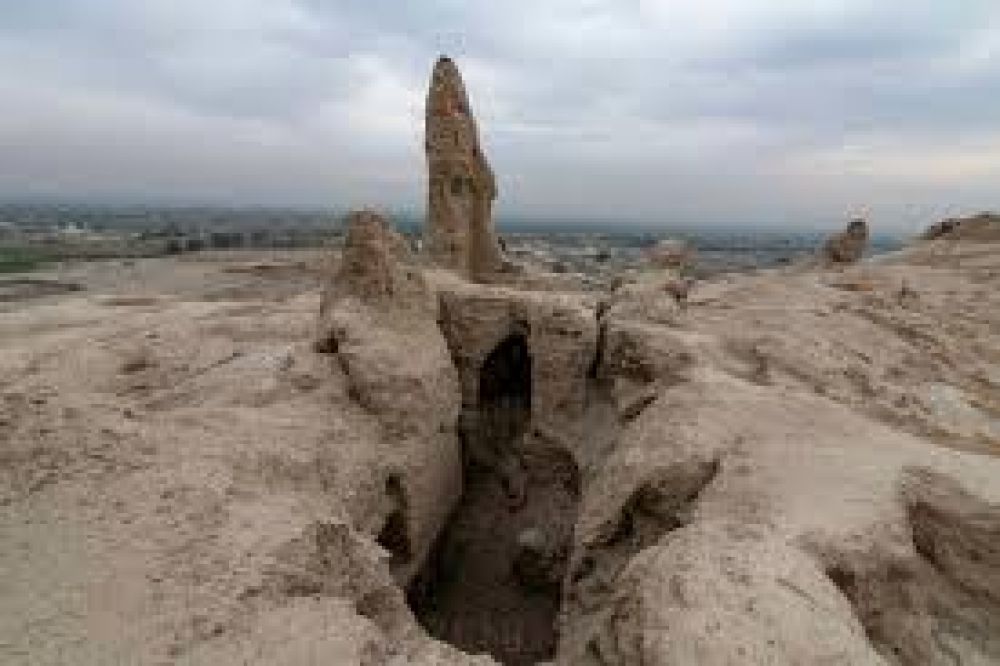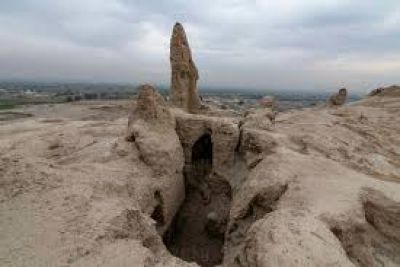

The Red Mosque, also known as the Shor Andam Mosque, is one of Kandahar's hidden gems. This historical mosque stands as a testament to the cultural and religious history of Afghanistan. It once served as a key place of worship and a hub for Islamic scholars. Exploring this ancient site provides an intimate glance into the religious practices and architectural preferences of the people who shaped the region’s history. Visitors will be captivated by the intricate designs and craftsmanship on display, from the detailed brickwork to the evocative calligraphy that adorns its walls. The mosque's tranquil atmosphere offers a unique space for reflection and photography. It remains a symbol of resilience amidst the country's tumultuous past. When visiting the mosque, one must be respectful of local customs and dress modestly, ensuring a harmonious experience within this sacred space.
Embark on a historical journey by touring the fascinating ruins of Old Kandahar. This archaeological site dates back to Alexander the Great and presents visitors with the awe-inspiring remnants of an ancient civilization. As you walk through the Old City, you will encounter the crumbling ramparts and fortifications that once protected its inhabitants. Historical knowledge unfolds with every step, providing a captivating narrative of the city's storied past. Local guides are often available to share legends and facts about the key figures and events that shaped the region. While there, it is essential to take the time to appreciate the craftsmanship of the stonework and the layout of this once bustling metropolis. Touring Old Kandahar is a moving experience, offering a profound connection with the region's ancestors and an understanding of the historical significance of Afghanistan's crossroads.
The Shrine of the Cloak, better known locally as the Kirka Sharif, houses one of Islam’s most revered relics – the cloak believed to have been worn by the Prophet Muhammad. This site is not only a spiritual center but also a place of great significance for Muslims worldwide. The cloak itself is only displayed to the public on very rare and special occasions, but the shrine's rich history and its position in the heart of Kandahar's religious life make it a must-visit. Visitors are typically awed by the serenity and spiritual ambiance of the shrine. Intricate blue tiles and inscriptions adorn the exterior, establishing the building as a masterpiece of Islamic architecture. As you enter the peaceful grounds and observe the devoted coming for prayer and contemplation, you get a palpable sense of the devotion this site commands. The experience at the Shrine of the Cloak of the Prophet Muhammad is one of spiritual reflection and historical insight, providing a deep connection to the Islamic faith for believers and non-believers alike.
The Mausoleum of Ahmad Shah Durrani, also known as Ahmad Shah Baba, is the resting place of the founder of modern Afghanistan and is considered a national hero. The solemn beauty of this mausoleum lies not just in its architectural elegance but also in its historical significance. Ahmad Shah Durrani unified the Afghan tribes and established a kingdom that left a lasting legacy. Visitors to the mausoleum will observe the classical Islamic design with its grand dome, marbled floors, and ornate calligraphy. The surrounding gardens offer a peaceful setting for contemplation about the rise and fall of empires and the notable figures who mark history. A visit to this mausoleum elucidates key aspects of Afghan identity and offers a profound perspective on the nation's formative years. It is a pilgrimage site for those wishing to pay respects to the 'Father of the Nation,' and a stop of utmost cultural significance on any visit to Kandahar.
Kandahar's Charsuq Bazaar is a vibrant marketplace brimming with the sights, sounds, and smells of traditional Afghan life. Navigating through this sprawling bazaar presents an eclectic array of goods, from handwoven textiles and intricately patterned carpets to exotic spices and fresh produce. It is a bustling center where locals and visitors alike haggle over prices and exchange stories. Engaging with the friendly vendors offers a chance to learn about the region's rich heritage and the craftsmanship that goes into their trade. The bazaar is also an ideal place to sample local cuisine, try a variety of dried fruits and nuts, or sip on traditional Afghan tea. The sensory overload of colors and commotion gives visitors an authentic slice of daily life in Kandahar. A shopping excursion at Charsuq Bazaar not only supports the local economy but also serves as an immersive cultural experience like no other.
For those looking to experience the rich literary tradition of Afghanistan, attending a traditional Pashto poetry gathering, known as a Mushaira, is an enlightening cultural activity. These gatherings are a celebration of Pashto language and its poignant, expressive poetry. Poets from Kandahar and surrounding regions congregate to recite their latest works, many of which delve into themes of love, war, loss, and the beauty of the Afghan landscape. Aimed at preserving and promoting the literary heritage of the Pashtuns, these events are often accompanied by the soulful sounds of traditional Afghan music, enhancing the emotional impact of the verses. Visitors will find themselves enthralled by the rhythmic narration and the communal atmosphere of shared stories and sentiments. Open to all, a Pashto Mushaira provides a unique window into the heart and soul of Pashtun culture.
Situated in the heart of the city, the Kandahar Museum is a treasure trove of Afghan history and culture. With a focus on the region's rich archaeological past, the museum showcases a wide range of artifacts, from ancient coins and pottery to weapons and traditional clothing. Each exhibit tells a story, tracing the influences of various empires—Greek, Persian, Mongol—that have left their mark on Kandahar through the millennia. The museum also dedicates part of its collection to highlighting the modern history of Afghanistan, including the Soviet occupation and the rise of the Taliban. History enthusiasts will appreciate the detailed timelines and narratives, while casual visitors will gain a broader understanding of the complex tapestry that is Afghan heritage. Visiting the Kandahar Museum is not only educational but also serves as a poignant reminder of the need to protect and honor the legacy of past civilizations.
A hike through the stunning landscapes of the Arghandab Valley is an exhilarating adventure for nature lovers and outdoor enthusiasts. Take a guided trek to explore the lush countryside, characterized by verdant fields, fruit orchards, and the serene Arghandab River. The region offers unspoiled vistas of the natural Afghan terrain, punctuated by traditional mud-brick homes and ancient ruins. Hiking in the early morning or late afternoon avoids the midday heat, making for a more comfortable journey. As one traverses the varied paths, opportunities abound to engage with local villagers and learn about their ways of life, from farming and crafts to rural customs. A hike in the Arghandab Valley is not only a physical activity but also a cultural exploration that offers an intimate perspective of Afghanistan's pastoral beauty and resilient spirit.
Immerse yourself in the culinary traditions of Kandahar by participating in a cooking class with local Afghan chefs. This hands-on experience will teach you the secrets of preparing authentic Afghan dishes such as kabuli palaw, bolani, and mantu. You will be involved in every step of the process, from selecting fresh ingredients at the market to mastering the techniques required to recreate the rich flavors of Afghan cuisine. The communal nature of the cooking class fosters a welcoming environment where stories and laughter are exchanged over the chopping board and stove. Participants can not only expect to broaden their cooking skills but also gain invaluable insight into the importance of food in Afghan culture. At the end of the class, the group sits down to a shared meal, relishing the fruits of their labor and the warmth of newfound friendships.
Carpentry is a time-honored craft in Afghanistan, and Kandahar offers the engaging experience of participating in a traditional carpentry workshop. Under the guidance of skilled artisans, visitors have the opportunity to learn the fundamentals of woodworking, using tools and techniques passed down through generations. The workshops not only cater to skill development but also provide a platform for cultural exchange. Attendees will work with native woods and materials, creating pieces that reflect the aesthetic sensibilities of the region. From carving intricate patterns inspired by Islamic art to assembling sturdy furniture designed with local motifs, these workshops are a testament to the enduring nature of Kandahar's craft traditions. Not only do participants walk away with a handcrafted souvenir, but they also contribute to sustaining the local craft industry by learning and valuing their intricate work.
